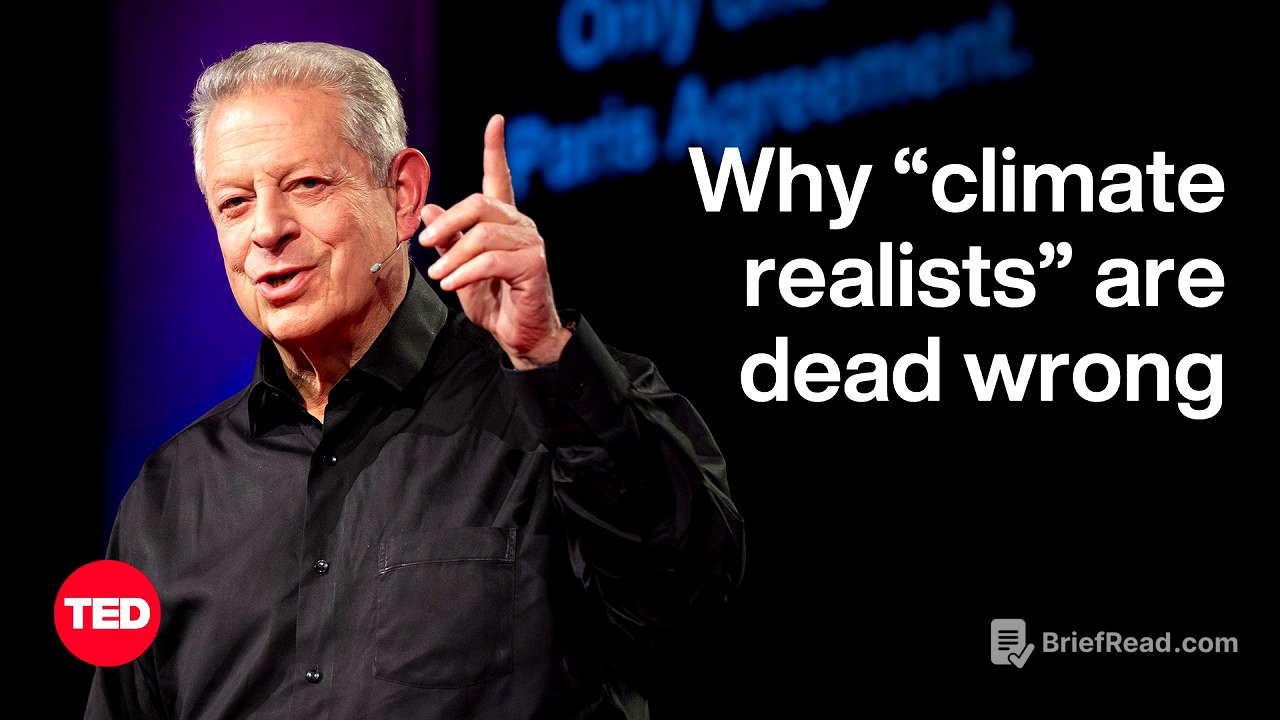TLDR;
Al Gore addresses the urgent need to combat climate change, challenging the "climate realism" promoted by the fossil fuel industry. He argues that ignoring the climate crisis's devastating impacts and focusing solely on adaptation is unrealistic and dangerous. Gore highlights the rapid advancements and cost reductions in renewable energy technologies, emphasizing the potential for a swift transition to a cleaner, more sustainable future. He criticises the political influence of the fossil fuel industry, which obstructs progress through misinformation and lobbying, and advocates for policy changes, including the removal of fossil fuel subsidies and the redirection of investments towards renewable energy, particularly in developing countries.
- The fossil fuel industry promotes "climate realism" to justify inaction on reducing emissions.
- Climate change is already causing significant damage, including extreme weather events, climate refugees, and economic losses.
- Renewable energy technologies are rapidly advancing and becoming more cost-effective than fossil fuels.
- Political will and policy changes are crucial to accelerate the transition to a clean energy economy.
- Developing countries need increased investment in renewable energy to achieve universal energy access and reduce emissions.
Introduction [0:08]
Al Gore acknowledges the Paris Agreement's 10-year anniversary, where 195 nations committed to achieving net-zero emissions by mid-century. He addresses the withdrawal process of one nation, the Trump administration's cancellation of climate-related executive orders, and the promotion of fossil fuels through the declaration of an "energy emergency." Despite these setbacks, investments in the energy transition doubled during Trump's first term, with significant growth in solar capacity, electric vehicle sales, and wind energy. Renewable energy accounted for 60% of new energy, while coal investments decreased by almost 20%.
The Falsehood of "Climate Realism" [1:31]
The fossil fuel industry dismisses the Paris Agreement commitments as unrealistic and advocates for "climate realism," which prioritises adaptation over reducing fossil fuel burning. Gore argues that while adaptation is necessary, it shouldn't replace efforts to address the root cause of the climate crisis. He challenges the notion that energy transitions must be slow, asserting that humanity can accelerate the shift to clean energy to protect civilisation. He also criticises the idea of increasing energy access in developing countries primarily through fossil fuels, advocating for cleaner alternatives.
Ignoring the Climate Crisis: A Dangerous Gamble [3:33]
Gore questions the realism of ignoring the potential for one to two billion climate refugees by 2050, driven by rising temperatures and uninhabitable conditions. He highlights the recent record-breaking temperatures and the expansion of physiologically unlivable areas. He warns of the potential for increased authoritarianism and ultranationalism due to climate-induced migration. He also addresses the economic consequences, including uninsurable regions and potential losses of trillions of dollars in global housing value. Acting on climate change, however, could add trillions to the global economy.
The Devastating Impacts of Climate Change [6:25]
Gore details the alarming rate of ice loss in Greenland and Antarctica, the accelerating sea-level rise, and the increasing frequency of extreme weather events. He notes the significant economic losses from these events and emphasises the accuracy of scientists' past predictions. He cites the severe drought in the Amazon, the widespread wildfires in Canada, and the increasing health impacts of the climate crisis, including air pollution and the spread of fungal infections. He also highlights the acidification of the oceans, the endangerment of coral reefs and fish species, and the risk of extinction for a significant portion of the planet's species.
Freshwater Scarcity and the Food Crisis [10:25]
Gore addresses the growing freshwater scarcity crisis, with 40% of the world's population already facing water shortages. He notes the dependence of a quarter of the world's population on meltwater from the Himalayan glaciers, which are projected to significantly shrink this century. He cites examples of extreme adaptation measures, such as covering glaciers with white sheets, and highlights the role of the fossil fuel industry in controlling policy. He also warns of the potential for a food crisis and questions the logic of ignoring these threats to avoid reducing fossil fuel emissions.
The Miraculous Decline in Renewable Energy Costs [11:49]
Gore questions why "climate realists" ignore the dramatic decline in the cost of renewable energy, suggesting it's due to the threat to their business models. He points out that cheaper, cleaner alternatives create more jobs. He highlights the consistent underestimation of solar capacity and electric vehicle sales by ExxonMobil and OPEC. Solar power is now the cheapest source of electricity in history. The world has installed twice as much solar as all fossil fuels combined since 2015, and electric vehicle sales have increased 34 times over since the Paris Agreement.
The Need for Accelerated Action and Policy Changes [14:55]
Despite the progress in renewable energy, Gore stresses that the world is still moving too slowly to meet the Paris Agreement goals. He identifies the fierce opposition to policies aimed at accelerating the transition and reducing fossil fuel emissions as the primary obstacle. He criticises the fossil fuel industry's use of distractions like carbon capture and storage, accusing them of capturing politicians and deceiving the public. He advocates for the removal of fossil fuel subsidies, which would free up trillions of dollars for investment in renewable energy, save lives, reduce emissions, and decrease income inequality.
Reforming the Financial Infrastructure and Investing in Developing Countries [17:59]
Gore argues for reforming the world's financial infrastructure to properly invest in addressing the climate crisis, particularly in developing countries. He notes that while most financing comes from private sources, developing countries are not receiving their fair share. He points out that 100% of the expected increase in emissions will come from developing countries, yet they receive less than 19% of the world's clean energy financing but almost 50% of the money for fossil fuels. He highlights the disparity in solar panel adoption between Florida and the entire continent of Africa, despite Africa's vast solar resources.
The Potential of Renewable Energy in Africa [19:09]
Gore criticises the "dash for gas" in Africa, with numerous fossil fuel pipelines under construction. He notes that the cost of one LNG terminal could provide universal energy access to all of Africa. He argues that instead of financing fossil fuel exports, investments should focus on providing Africans with access to renewable energy. The potential for solar and wind in Africa is far greater than that of fossil fuels, and every country in Africa could achieve 100% energy access using a small fraction of its land.
Ignoring the Benefits of Renewable Energy and the Dangers of Methane [20:25]
Gore highlights the advantages of solar and wind energy, including the absence of fuel supply-chain risks and price volatility. He notes that renewable energy creates three times as many jobs per dollar spent compared to fossil fuels. He also emphasises the significant impact of methane leaks, which make natural gas as harmful as coal. He criticises fossil fuel lobbyists for opposing legislation to address methane leaks.
The Peak of Fossil Fuels and the Power of Human Action [21:20]
Gore suggests that the "climate realism" theory is driven by panic over the loss of fossil fuel markets. He notes that all fossil fuels are projected to peak within the next few years, and the majority of investment is now going towards renewable energy. He highlights the significant progress in renewable energy deployment and the potential to reduce emissions by 50% this decade. He concludes by emphasising the capacity of human beings to make the necessary changes to save the future, urging action and the renewal of political will.









